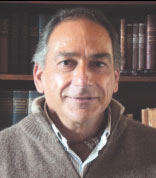 Dr José Foglia
MD
Dr José Foglia
MD
Dr Foglia grew up and was educated in Punta del Este and
in Montevideo where he attended the Deutsche Schule.
He graduated in 1979 as a doctor from the Medical School
of Montevideo and specialized in General Surgery and
Hemotherapy. He also became interested in acupuncture
and other health-related therapies. For 5 years he taught
Biology and Pathophysiology at The School of Nursing.
He joined the Theosophical Society in 1978 and became
interested in the teaching of Jiddu Krishnamurti who he
met on his trips to India. Following these visits he decided
to travel to various countries to learn about other cultures
and ancient civilizations.
In 1983 he moved to Montpellier in France for 3 years to
study General Surgery and related techniques in
Hemotherapy. In 1987 he moved to Rome Italy to
continue his medical studies at the Catholic University
Medical Faculty and subsequently stayed in Europe until
1996.
On returning to Montevideo he dedicated his time to
studying the link between the psyche and the body.
While at the Faculty of Medicine of Punta del Este he
continued his studies graduating in
psychoneuroendocrineimmunology in 2012. He published
his monograh on 'The Neurophysiology of Meditation'.
From 2002 to 2010 he researched and published a book,
'Homo Lux'. Currently Dr Foglia is working to investigate
the human potential and developing a new approach to
medicine.
2015 - Neuroplasticity - Epigenetic - Nutrition
Any man could, if he were so inclined, be the sculptor of his own brain:
Santiago Ramon y Cajal (1852-1934) Considered by many to be the father of
modern Neuroscience.
We can reinvent our brains and (there by ourselves) through neuroplasticity. Our brain undergoes
daily renovations to adapt to our ever changing world. The brain, with its neuroplastericity has the
ability to modify its structures and neural mechanisms. Changes in brain function occur as the brain
re-wires itself in response to new demands placed on it by the external environment. The brain is
also capable of changing its’ structure by its own decision and conscious will.
It has an extraordinary capacity to learn, unlearn and relearn. The Central Executive takes the
decisions in our lives and plans strategies to achieve our goals. The mammalian brain introduces the
affective tone and the polarity pleasure –pain that conditions the human behaviour with
motivation. Consequently ,to escape from the crisis of abstinence we become dependant on the
Reward System . This vicious circle provokes a metabolic disorder for example, obesity ,Type 2
diabetes and hypercholesterolemia. Awareness in our nutritional habits requires us to be free of the
mechanism of dependence. Homo sapiens must transcend motivation and focus their nutritional
habits to create a healthy attitude to life.
A person planting a thought , reap an action, sow an action, reap a habit sow
a habit, reap a character sow a character reap a destiny Swami Sivananda
(1887-1963) One of the great Yoga Masters of India